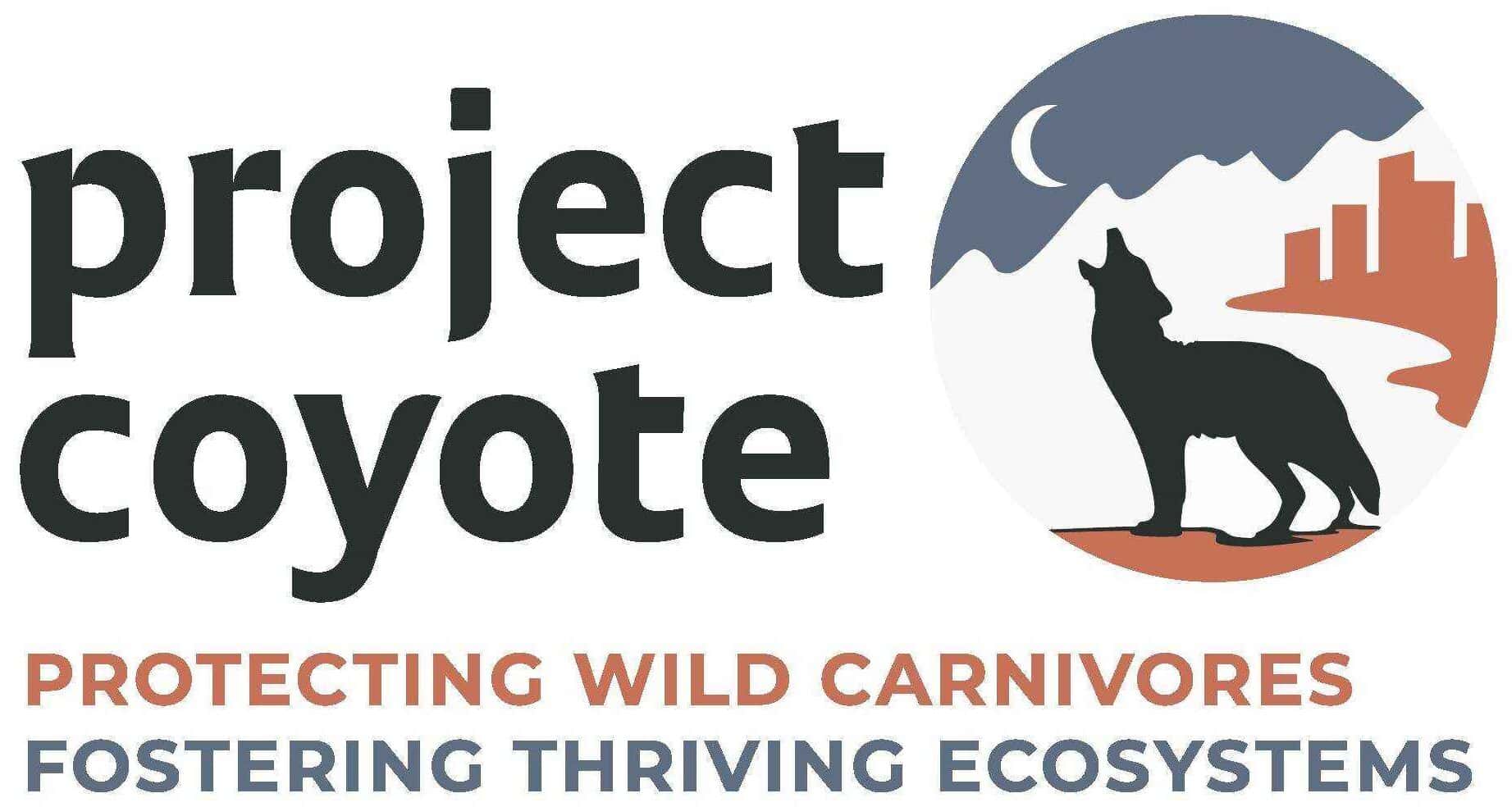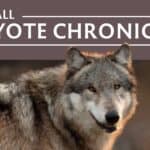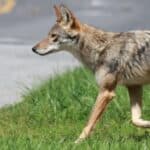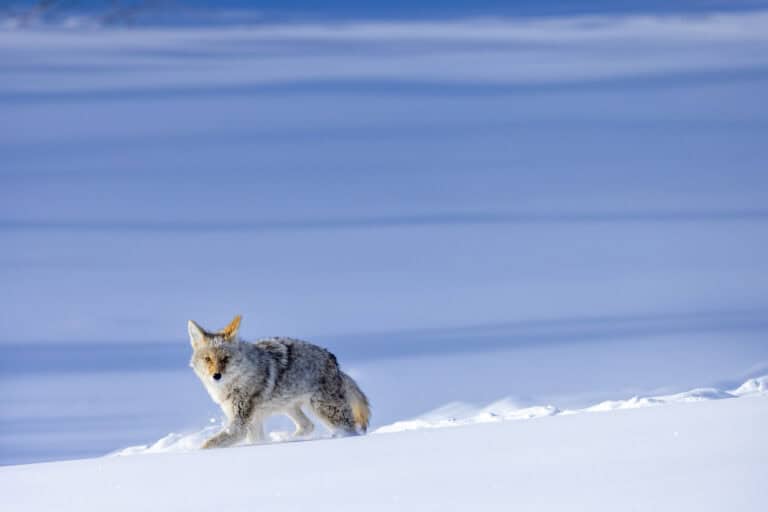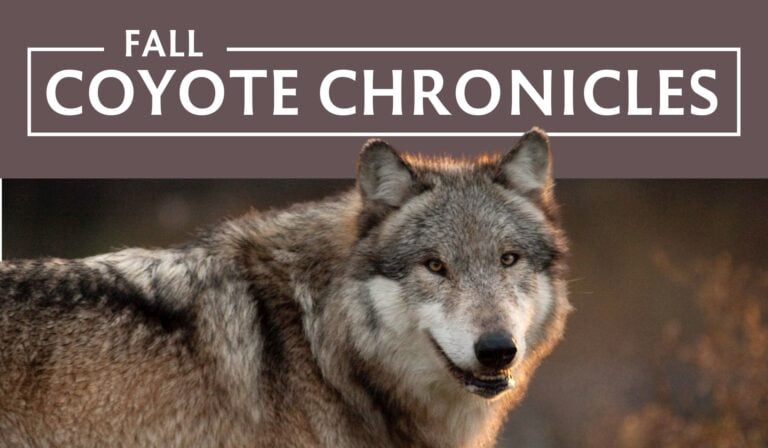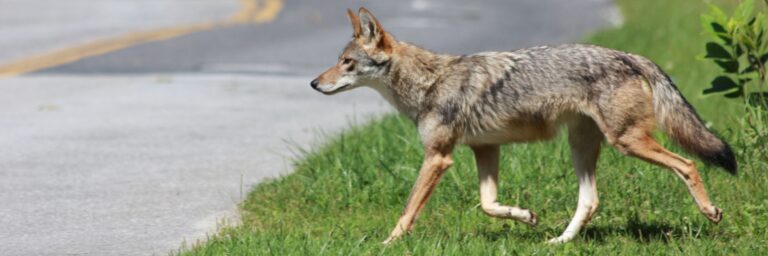IN THIS ISSUE:
- The Science of Ending Wildlife Killing Contests
- New Resources for Ranching With Wildlife
- Coyote Friendly Communities Take to the Streets
- An Interview With Ranching With Wildlife Coordinator Keli Hendricks
- Young Voices for Humane Heroes
- At the conference: North American Congress for Conservation Biology
- Other News
August Issue, 2016
In this month’s Coyote Chronicles, I am excited to share a number of program and campaign advances. Our Coyote Friendly Communities Program continues to expand nationwide, most recently allying with San Francisco’s Animal Care and Control, Parks and Recreation Department and SF Dog and has developed new, co-branded resources to hang on front doors and to post at trailheads and park entrances with tips for coexisting peacefully with coyotes. These resources offer advice on how to handle coyote encounters as well as directions to access downloadable materials and information available on Project Coyote’s new website.
We are also stepping up our efforts to end wildlife killing contests with a current focus in Nevada where the state’s Board of Wildlife Commissioners will meet to discuss the issue on August 12th in Reno. Project Coyote has sent the Commission a letter on this issue, signed by 50 Project Coyote Science Advisory Board members and scientists expressing unified support for the prohibition of wildlife killing contests, derbies and tournaments, including prohibition of contests targeting coyotes, which are promoted throughout the United States. You can listen to me and Project Coyote volunteer Jana Hofeditz discuss killing contests in Nevada during this radio interview, as well as the proposed policy that will be considered by the Nevada Board of Wildlife Commissioners on August 12th.
Meanwhile, we have just launched our 2016 Ranching With Wildlife Workshop page which features videos of the presentations, an interview with our Ranching with Wildlife Coordinator Keli Hendricks, and resources to share information about successful nonlethal livestock protection techniques.
Finally, I was touched and honored to receive a “Humane Hero” award from Grace Sykes, a fourth grade student at Fairfax Manor Elementary school. Her compassion for wild animals and strength of character gives me hope that our younger generations will continue to value and defend our wildlife and the environment on which we all depend. These stories and more await – enjoy!
For the Wild,
Camilla H. Fox
Founder & Executive Director
The Science of Ending Wildlife Killing Contests
In November, 2015, the Nevada Wildlife Alliance, with which Project Coyote is allied, petitioned the Nevada Board of Wildlife Commissioners to prohibit wildlife killing contests in Nevada. Our Nevada supporters not only wrote letters to the Nevada wildlife commission, but also showed up to testify in support of the petition. Despite our best efforts, the commission rejected the petition and instead said they would pursue a policy regarding wildlife killing contests. You can read Project Coyote’s comments about that policy, which will be debated at the upcoming commission meeting in Reno. Project Coyote has been working hard to expose the atrocity of wildlife killing contests. Nevada supporters and citizen leaders are already signing up to help screen our new short film once it is completed to help raise public awareness about the issue. Learn more about this campaign and watch a trailer of the film here.
New Resources for Ranching With Wildlife
On March 26, 2016, California ranchers, wildlife experts, policy makers and concerned citizens gathered in Petaluma, at the Rockin’ H Ranch & Vineyards to learn about the Marin Livestock & Wildlife Protection Program and non-lethal solutions to reduce livestock-predator conflicts. The workshop was organized by Project Coyote and co-sponsored with Fibershed and the County of Marin in order to exchange information about traditional deterrent techniques such as livestock guard animals, and to introduce new innovations, such as E-Collars and Foxlights. Visit the page now to explore and learn more.
Coyote Friendly Communities Takes to the Streets
Recently Project Coyote’s Coyote Friendly Communities Associate Jenny Grant provided a talk for the National Parks Conservancy as part of a special National Park Service Centennial event celebrating the Park’s 100 year birthday. Speaking to more than 50 high school students, Jenny provided an overview of coyote ecology including a detailed discussion about coexistence that ended with a group howl. Jenny fielded questions about hazing and safety, and the crowd showed interest in increasing informational signage in their communities. to answer this request, Project Coyote has been busy developing new tools such as a door hanger with a QR code that links to a PSA that is co-branded with San Francisco Parks & Recreation; we’ve also created a Coyote Dog flyer that offers tips on being a responsible dog guardian especially around pupping season.
In a recent Notes From the Field blog post, we also tapped Project Coyote’s Vermont Representative and Wild Canid Ecologist Chris Schadler for seasonal advice, tips and tools about coexisting with coyotes and for information about why killing is not an effective strategy for addressing conflicts
Project Coyote’s Southern California Representative Randi Feilich has been busy on this front as well, assisting the city of Los Angeles in adopting a proactive coyote coexistence plan that emphasizes public education and outreach. At the City’s recent meeting on this issue on August 3rd, Randi reiterated the offer of Project Coyote’s assistance through our Coyote Friendly Communities program, noting that, “Communities including San Francisco, Marin County, Calabasas and others are all implementing aspects of this program that include science-based materials and signage to workshops, hazing trainings, public service announcements and other tools and resources.” City officials postponed the decision;Project Coyote will continue to press for a proactive approach to coexistence.
You can visit Project Coyote’s website to learn more about our Coyote Friendly Communities Program, and take a moment to enjoy a recent radio interview on the subject with Project Coyote’s Massachusetts Representative John Maguranis and Project Coyote’s Founder and Executive Director Camilla Fox.
Interview: Ranching With Wildlife Coordinator Keli Hendricks
In March of 2016 Project Coyote, Fibershed and the County of Marin co-sponsored a workshop designed to share wisdom and build knowledge around non-lethal approaches to protecting livestock from predators. Nearly 100 people turned out for this day-long event that covered topics ranging from innovative new predator deterrents such as Foxlights and E-Collars to sustaining traditional practices like livestock guard animals and proper fencing. Presenters offered information on the biological rationale for choosing non-lethal methods, field research findings, wildlife rescue reports, and first-hand experiences from ranchers.
Project Coyote’s Ranching with Wildlife Coordinator Keli Hendricks organized the event which took place in Petaluma, California at her family’s Rockin’ H Ranch. As Keli says in this interview, “We are looking into doing another co-sponsored workshop in Northern California. We are also working on a film about the Marin Livestock & Wildlife Protection Program to help share this successful model with other communities across North America.”
Young Voices for Humane Heroes
My Humane Hero is Camilla H Fox – someone who speaks a voice for those who don’t have one. — Grace Sykes, Fairfax Manor School
As part of our Keeping It Wild program, Project Coyote educates young people about predators and coexistence, fostering respect and compassion for wildlife and environmental and scientific literacy. One of our heroes is Fairfax Manor’s fourth grade teacher Laura Honda, and her students’ “Green Team” – who together speak up for a more humane and compassionate world. Each year the Fairfax Manor Green Team give awards to people they select as Humane Heroes. Some are historical figures, like John Muir, and others are active today. This year, students chose Project Coyote’s Founder and Executive Director Camilla Fox, and ten-year-old Green Team member Grace Sykes presented the award to Camilla during a visit to Project Coyote’s office. “I could not be more inspired and filled with hope by caring teacher Laura Honda enthusiastic students like Grace Sykes, and the whole Green Team,” Camilla said. “Thanks to Laura many of these young, compassionate and courageous students will become the next generation of conservationists.”
In the past few years the Green Team and Laura have helped Project Coyote achieve key victories for wildlife. By appearing at hearings, testifying, and writing letters to commissioners, they have been instrumental in persuading California’s Fish and Game Commission to ban both bobcat trapping and predator killing contests in California.
See the Green Team in action.
Read about the victories in California to ban bobcat trapping and predator killing contests.
At the Conference: North American Congress for Conservation Biology
In July Camilla Fox joined members of Project Coyote’s Science Advisory Board in Madison, Wisconsin for the North American Congress for Conservation Biology Conference.
Science Advisory Board members David Parsons and Adrian Treves presented a session titled Communication at the Intersection of Science and Policy: Progress and Pitfalls Between Scientist, Government Agencies, and the Media, a hot topic in the conservation world. Science Advisory Board member Michael Soulé, widely considered to be “the Father of Conservation Biology” and one of the original founders of the Society for Conservation Biology, presented a talk called Subversive Ecology, addressing the “five prongs on conservation’s pitchfork” that include overhunting and overfishing and the annihilation of megafauna such as large, keystone predators that are reducing the viability of the Earth’s residual wild biota.
And Science Advisory Board member Bob Crabtree focused on canines in Yellowstone and what they can teach us about lethal control and unregulated killing of a territorial species.
During the week, Project Coyote Science Advisory Board members and Camilla gathered with colleagues who are part of a Large Carnivore Working Group to discuss how the Public Trust Doctrine can be used to advance wildlife conservation, and how the ecological sciences can be better coupled with the social sciences to address human-predator conflicts. In the coming months we will share the initiatives, policy changes and actions making real change because of gatherings like this.
Watch a clip of Adrian Treves discussing the Public Trust Doctrine at our first Large Carnivore Working Group meeting in Yellowstone National Park.
OTHER NEWS
COYOTE ECOLOGY: THE RITES (AND WRONGS) OF SPRING & EARLY SUMMER
Springtime and early summer mean birth, growth, and renewal. For coyotes, it can also mean bullets, arrows, and killing contests. Killing contests are permitted in nearly all US states, and they are often held at night during the coyotes’ short window for breeding.Read More
Read an Op Ed by Dan Flores, author of the new book, “Coyote America: A Natural and Supernatural History.”
Wolfdog Radio Interview
Listen to an interview on WolfDog Radio with Project Coyote’s John Maguranis and Camilla Fox.
Join our E-TEAM
Get periodic e-news, action alerts, and join our growing network of educators, scientists, predator friendly ranchers and citizen leaders who are helping people and wildlife coexist in our communities.
Join a growing community of educated and empowered citizens by expressing your commitment to compassionate conservation with a financial investment.
You can DONATE, become a SPONSOR or leave a LEGACY GIFT.
